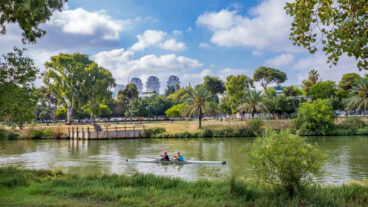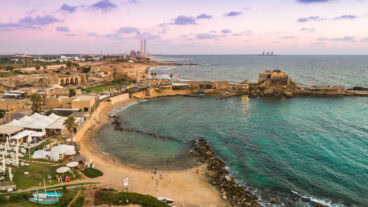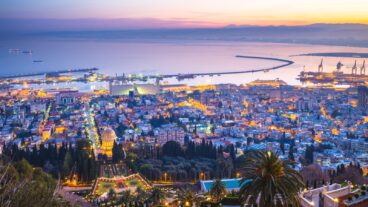The Abu Gosh Vocal Music Festival, with top musicians performing in acoustically superior venues, strikes a chord among all Israelis – Jewish, Muslim and Christian.
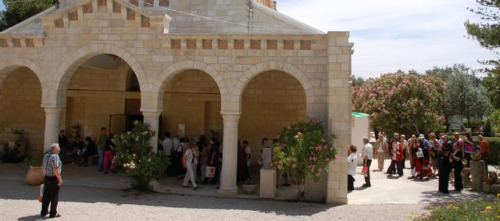
For the past 19 years Gershon Cohen has directed and produced Israel’s one and only vocal festival, the Abu Gosh Vocal Music Festival.
It is important to Cohen that the festival takes place in the Muslim Arab village of Abu Gosh, which boasts some of the best acoustic venues in the country – located in the crypt of the Crusader Church, the Benedictine Monastery, and the Kiryat Ye’arim Church.
But it isn’t just the venues that attracted him to the Arab Muslim village. “I wanted to do something in a Muslim village, and this is a Muslim village with Christian churches, and attendees are Muslim and Christian Arabs and Jews. You can’t ask for a better pluralism,” he tells ISRAEL21c.
Cohen, 70, from the nearby town of Sho’eva, revived the festival, which began in the 1950s, but had died out by 1969. “I fell in love with the music and decided to start up the festival again,” he says. “This is the only vocal festival in Israel and it is really very beautiful.”
Abundance of local talent
Twice each year, at Sukkot and Shavuot, more than 8,000 vocal music fans from Eilat in the south to Metulla in the north, and from across Europe, descend on the pastoral town of Abu Gosh, on the outskirts of Jerusalem, to hear sweet songs of all sorts, from Mozart to Irish folk.
The upcoming festival will include some non-Israelis, as well. Among the 16 indoor concerts that will take place throughout the four-day event from September 29 to October 2, are two concerts by vocal ensemble Voces8, from London, England, and three concerts featuring the Kammerphilharmonie-Hessen chamber orchestra, from Essen, Germany.
According to Cohen, there is so much local talent that it’s rare for the festival to host more than one international guest, despite the fact that they receive several requests for participation from ensembles and orchestras abroad.
“There are very good orchestras in Israel and so there is no need to bring them from abroad,” Cohen says, mentioning the Rishon LeZion Symphony Orchestra, the Ra’anana Symphonette Orchestra, the Jerusalem Symphony Orchestra, and the Israel Philharmonic Orchestra. “We have a lot of excellent musicians in Israel. The competition here is very high.”
Cohen attributes this abundance of musical talent to the flood of Russian immigration to Israel in the early ’90s. “They brought a lot of musicians and this was very good,” says Cohen. “It’s a big part of their culture and we are very happy about that.”
Israelis love music
Attendees have come to rely on the familiar structure and talent that appears at the festival and Cohen likes it that way. “We’re really not looking for ‘different’,” he says. “This makes it nice because the audience knows what to expect.”
While many of the festival’s musicians and audience members remain the same, the event’s repertoire changes with each festival. This Sukkot, the festival will open with Brahms’ German Requiem, conducted by Hanna Tzur, the festival’s long-time musical director. Other concerts on the roster include sacred French music and chansons; a Balkan festival; songs of great American folk singers; a Baroque hit parade; Irish folk songs; and a concerto and mass of J.S. Bach’s Cantata.
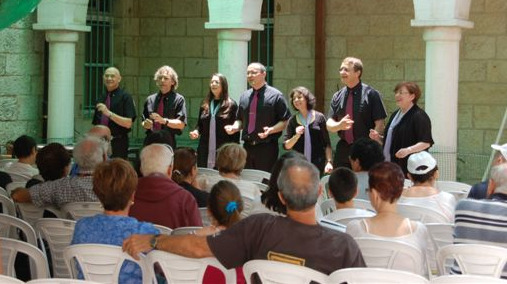
Besides the 16 ticketed indoor concerts, the festival will also feature more than 20 outdoor performances at five different locations around Abu Gosh. These include opera singing with Israeli Opera pianist Eitan Shmeisser, concerts by accordion virtuoso Emil Aibinder, among various other performances by Israeli folk singers, choirs, and small chamber groups. The event will also feature a wine tasting pavilion and a small bazaar, hosting local artisans.
Cohen says that these are just extra charms. The reason why attendees keep coming back, season after season, is the music. “All music is very popular in Israel – jazz, pop, classical, you name it. Israelis love music, and this music has a particularly loyal following.”




